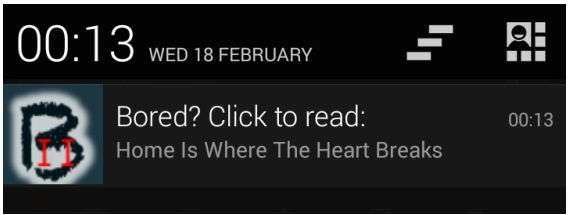September 3, 2015 weblog
Bored phone user is more open to consume suggested content

Do you ignore your phone and try connecting to the world without it when you are bored, or do you eagerly check certain stuff out on your phone precisely when you are bored?
Researchers from Stuttgart and Barcelona are interested in what mobile phone usage reveals about user boredom—and what user boredom engenders in mobile phone usage. Martin Pielot, Tilman Dingler, Jose San Pedro, and Nuria Oliver have written a paper, "When Attention is not Scarce -Detecting Boredom from Mobile Phone Usage."
Fundamentally, said the authors, "These findings enable boredom-triggered proactive recommender systems that attune their users' level of attention and need for stimulation." In a two-week in-the-wild study, they collected over 40,000,000 usage logs and 4398 boredom self-reports of 54 mobile phone users. They showed that a user-independent machine-learning model of boredom can infer boredom with an accuracy (AUCROC) of up to 82.9 percent.
Dave Gershgorn in Popular Science explained their attempt this way: "In an effort to identify and banish smartphone boredom, researchers from Telefonica Research in Spain have developed Borapp, a boredom testing tool, and its sibling Borapp 2, a boredom curing tool."
Martin Pielot, study co-author, said, "Participation was possible by installing and running Borapp app on your Android phone. The app collects sensor data when your phone is in use and – few times each day – ask for your emotional state."
On Wednesday, Rachel Metz in MIT Technology Review commented on their research:
"Add 'boredom detector' to the seemingly endless list of things your smartphone can do. A group of researchers say they've developed an algorithm that can suss this out by looking at your mobile activity, considering factors like the time since you last had a call or text, the time of day, and how intensely you're using the phone."
While Borapp is mainly for data gathering, researchers built Borapp 2 to actually remedy listlessness, said Gershgorn. "If the app thinks a user is bored, it will send a notification suggesting a place on the internet designed to kill time with cat GIFs and digestible news: BuzzFeed."
Rachel Metz also explained, "To validate the resulting algorithm, researchers built another Android app that concluded on its own whether the user was bored, and, when it did, sent an alert to their phone asking if they wanted to read an article on BuzzFeed's news app. A separate set of study participants used it for two weeks, and researchers found that the people who'd been identified as bored were more likely to click on the alert to see the story, and to spend time looking at it, than those who were randomly sent an alert."
The researchers computed click ratio, defined as the number of notifications clicked in a condition divided by the total number of notifications presented in this condition. They also used engagement-ratio, defined as click-ratio, but in addition to clicking the notification, BuzzFeed also had to be kept open for at least 30 seconds.
The researchers said that "Mobile phones are a commonly used tool to fill or kill time when bored, especially while being on-the-go. These devices are most likely to be present in all kinds of boredom prone situations, such as subway rides, in class, or while waiting. In such situations, we turn to our phones to kill time, i.e., for self-stimulation without having a particular task in mind."
The authors said their in-the-wild study found that users were more likely to engage with suggested content on their phones when they were bored.
Potential application scenarios which they envision include engaging with users via interesting suggestions (e.g., videos, activities) in moments of boredom; and suggesting useful activities (e.g., clearing the backlog of a todo or read-later list).
In the bigger picture, Pielot, in talking about his work, said he explores "how the increased number of services that constantly request our attention affect our lives, to find out how to innovate these services to be less stressing & interrupting, and more enjoyable and connecting."
The team's paper said, "apps that most strongly correlated with being bored were Instagram, email, settings, the built-in browser, and apps in the 'other' category. Apps that correlated most strongly with not being bored were communication apps, Facebook, SMS, and Google Chrome."
More information: When Attention is not Scarce - Detecting Boredom from Mobile Phone Usage: pielot.org/pubs/Pielot2015-Ubi … oredom-Detection.pdf
© 2015 Tech Xplore

















